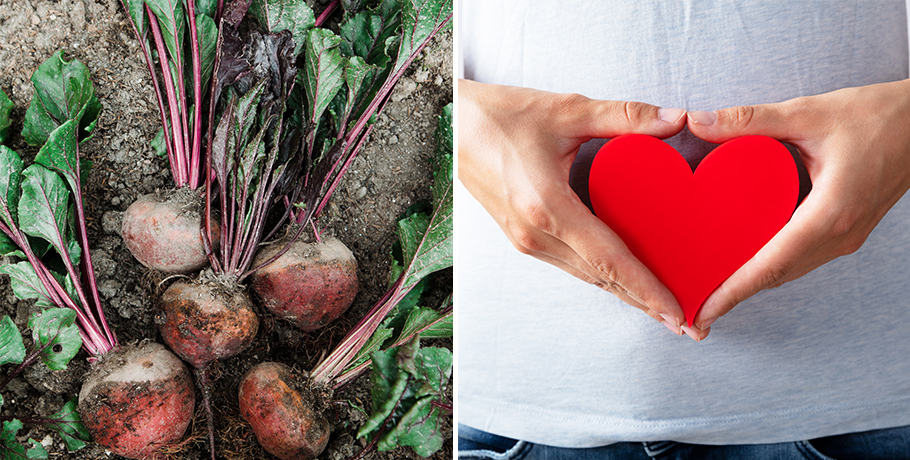
The Heart – The World’s Most Important Pump
The heart is a muscular, hollow organ with two atria and two ventricles. Its function is to act as the pump for the cardiovascular system. The heart is extraordinary, pumping around five liters of blood in five minutes and about 300 liters in an hour with approximately 4,200 heartbeats. In other words, the heart beats around 100,000 times a day, year after year.
Blood vessels supply all organs with blood. Arteries carry oxygen- and nutrient-rich blood to various tissues, while veins return oxygen-depleted and nutrient-poor blood to the heart. Vitamin C contributes to normal collagen formation, which is essential for the normal function of blood vessels. A deficiency in vitamin C can impair vascular health. Vascular problems can be the starting point for more serious cardiovascular issues and should be taken seriously, with regular check-ups from healthcare professionals.
Read our practical tips on how to support the heart, blood vessels, and achieve optimal blood pressure.
6 Simple Tips for Heart, Vascular Health, and Blood Pressure
Avoid high blood sugar and insulin resistance, which are among the worst conditions you can have if you suffer from high blood pressure or cardiovascular issues. High blood sugar and insulin resistance can be reduced by avoiding refined carbohydrates, grains, soda, fruit juices, sugar, and agave syrup. Have a protein-rich breakfast and consume most of your carbohydrates after exercise.
Eat fatty fish rich in omega-3 regularly, but choose fish lower in the food chain and known to be free of heavy metals or other toxins. Avoid farmed salmon. In 2011, leading fishery experts recommended reducing consumption of tuna and salmon in favor of sardines and herring to help preserve global fish stocks. Their analysis was the most comprehensive ever conducted on global fish populations.
Eat beets. They are rich in nitrates, which are converted by oral bacteria into nitrites. When swallowed, nitrites are further converted into nitric oxide in the stomach, which has a vasodilating and blood pressure-lowering effect. However, adequate zinc levels are necessary for this process. While including beets in your diet is beneficial, avoid foods with added nitrates or nitrites, such as E 249 (potassium nitrite), E 250 (sodium nitrite), E 251 (sodium nitrate), and E 252 (potassium nitrate).
Drink green tea. Research shows that regular consumption of green tea significantly reduces the risk of high blood pressure.
Exercise regularly. Studies indicate that regular physical activity lowers the risk of obesity, reduces insulin resistance, and lowers blood pressure. Aim for 150–300 minutes of physical activity per week, divided between brisk walking, strength training, and light high-intensity workouts.
Avoid nutritional deficiencies. The following vitamins and minerals positively influence blood, blood vessels, and the heart. You can find them all here:
– Thiamine (Vitamin B1) contributes to normal heart function.
– Riboflavin (Vitamin B2) helps maintain normal red blood cells.
– Pyridoxine (Vitamin B6) supports normal red blood cell formation.
– Cobalamin (Vitamin B12) contributes to normal red blood cell formation.
– Folate aids normal blood formation.
– Iron contributes to the normal production of red blood cells and hemoglobin.
– EPA and DHA, found in Eskimo-3, support normal heart function.
– Vitamin C promotes normal collagen formation, essential for the normal function of blood vessels.
– Vitamin K2, together with vitamin D, ensures calcium ends up in the bones rather than in the arteries. Excess calcium in arteries can lead to calcification, increasing the risk of high blood pressure and cardiovascular problems.
– Coenzyme Q10 (CoQ10): Research shows that daily intake of CoQ10 with selenium can significantly reduce the risk of cardiovascular disease by up to 50%. The dosage studied was 200 mg CoQ10 and 200 μg selenium per day for four years.
If you want to optimize your heart’s function, vascular health, and blood pressure, follow the advice above and use the products mentioned. You can find all the products here.
Self-Care Protocol
Our self-care protocols are not intended to diagnose, treat, or cure diseases. They are recommendations and tips for self-care and do not replace conventional medical care. These protocols are intended for adults only. Dietary supplements should not be used as a substitute for a varied diet. A diverse and balanced diet and a healthy lifestyle are essential.
